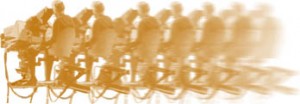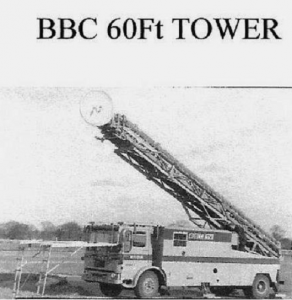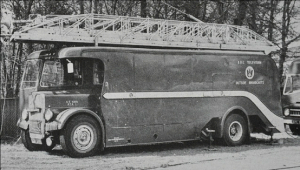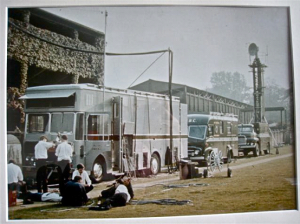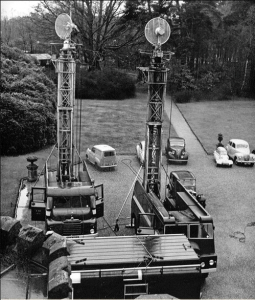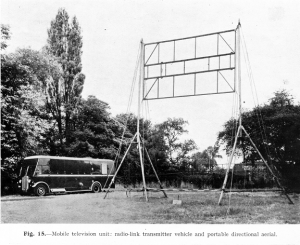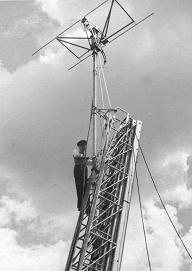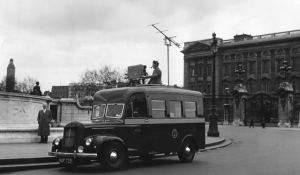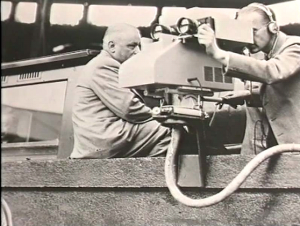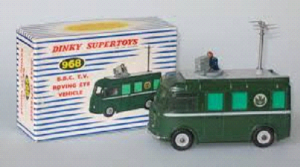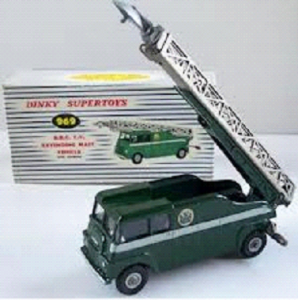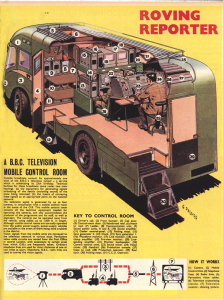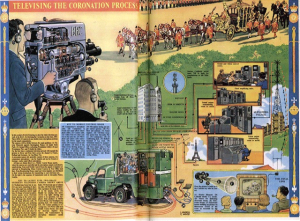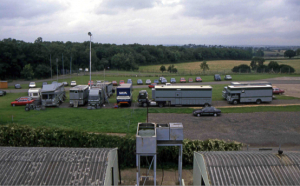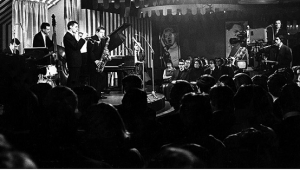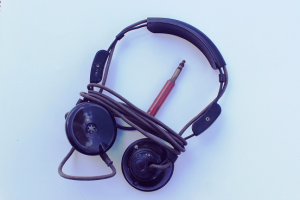Alasdair Lawrance
This is a photo I got from the sometime Works Manager of Eagle in Warwick. It is all the information he’s got, but it is strikingly different to the Dinky Toys model. I don’t know what the step ladders at the front are for – maintenance of the dish when the mast is ‘parked’?
Eagle are still in business in Warwick,
Robin Sutherland
The picture is of PTA 3 or 4. This was a larger version of an Eagle Tower (as per the Dinky Toy) but was also made by Eagle. Two were purchased by OBs in the 1970s to replace two earlier variants. They were known as PTAs – Power Transmitter Aerials. Two of the type were purchased to replace two earlier mast vehicles PTA 1 & 2. I’m pretty sure they went higher than the 60ft of an Eagle tower but they had a higher payload and could carry multiple aerials. The ladders and platform at the front were used by comms chaps to rig and derig the aerials with the mast in the fully down position. I’m sure Mike Jordan will be able to give fuller details.
The old ones were lovely vehicles based on an AEC coach chassis with a single drivers cab and a Merryweather fire escape ladder mounted at the rear.
Teething troubles with the replacements meant the old ones soldiered on later than planned and one driver who had stopped at a transport cafe on the A1 on his way to an OB was asked if he was taking part in a historic vehicle run.
Photo below of PTA 1. Eagle tower vehicle shown to the right with CMCR1 at Wimbledon:
Further investigation tells me that PTAs 3 and 4 were delivered to OBs in 1973 on Leyland Lynx chassis. The height was 100ft as opposed to the 60ft of an Eagle tower. The other difference was that PTAs also contained the transmitting equipment etc in the vehicle whereas an Eagle Tower was just a mast and needed a separate links truck to process the signal.
A photo of two Eagle Towers at Kingswood Warren taken around 1959. Also of interest to me is the Messerschmitt bubble car parked nearby.
John Howell
Even earlier? This picture came from an IEE publication dating from December 1938: "The London Television Service" by T. C. Macnamara and D. C. Birkinshaw.
They say that "the series phase array ……was clearly not a very convenient form of aerial for mounting at greater heights…”
You can say that again! There was also a generator vehicle containing an 30KW alternator.
Interestingly I have just recently scanned a few pages from the AP Technical Handbook dated 1938 all about the receive side of the OB link installation which may have been the "other end" of this.
It is perhaps a bit techie but good reading nevertheless. The final system used on the PTAs was a smaller version of this shown but still a fairly similar layout. I do have a photo if anyone is interested. I don’t know what the vehicle shown was exactly. It may not have been "Scanner 1" but it does seem to have the characteristic opening sides continued on later versions of PTAs which were probably to get access to the huge transmitter and the inbuilt generator and could be opened up in sections to provide a "service hatch" for distribution of cups of tea on site!
The generator was mainly to power the transmitter but the power to the scanner was routed through the vehicle to be a standby power source via a changeover switch on the big switchboard!
A photo of the aerial on the tower – complete with the delicately poised rigger outside the ladder and sadly missing his safety belt.
– and a quick photo, for those camera staff with long memories, of the 1954 Roving Eye with a proper big camera on top next to a very dirty Buckingham Palace!
And what must have been a 3D camera (twin lens?) – no actually optical viewfinder of course hopefully tracking the lens in use in 1937. Love the superthin camera cable, precursor of the single fibre used on the Boar Race remote cameras this year. No connectors – spliced joints as needed nowadays. Plus ca change!
Mike Giles
But I’m pleased to see the rigger was wearing his regulation cap. At one time I think they were on a disciplinary interview if seen driving a BBC vehicle without it!
I also recall that at one time riggers were supplied with all their uniform except for shoes, as BBC management considered it "de rigueur" for any gentleman to have black shoes in his wardrobe.
Albert Barber
John Bennett
An interesting BBC Dinky Toys page here http://www.planetdiecast.com/index.php?option=com_kunena&func=view&catid=125&id=49655&limit=15&limitstart=615&Itemid=0
Barry Bonner
From the “Eagle” …
Dave Thompson
Here is the “Eagle” cutaway of the Coronation.
The facsimile publishers have made a mess of the join in the picture but the majority is okay.
There’s even a sound cct for Bush House. This was for the BBC European Service in the South-East Wing of the building – the rest of the Overseas Services were not moved from Oxford Street until 1958.
Geoff Fletcher
Silverstone August 1988. Not an Eagle Tower in sight but a dish in use – but one for all the ex OB boys. I think this was maybe a Birmingham based unit – I remember I met Keith Salmon while I was there that day as Unit Manager for Anglia’s coverage of the Truck GP.
Jazz 625
Peter Cook
This picture of Jazz 625 was taken at the Marquee Club with cameramen Paul Graham on a dolly rigger, Maurie Wintern lurking in the shadows and possibly myself as a trainee standing in attendance listening to talkback on personal issue long lead STC cans. Notice. noise cancelling cans not yet in use in TV, so perhaps cost prohibitive even then. I wonder why my hearing is now poor.
Louis Barfe, Len Shorey, Peter Cook
This musicians are:
The drummer is Alan Ganley,
trumpeter Jimmie Deuchar,
saxophonist Tubby Hayes and
Freddie Logan the bass player.
The chap camera right of stage is Steve Race as presenter.
Tubby Hayes, like all of us, looked very young. I would have been more sure if he was playing flute.
Alec Bray
Standard BBC issue Cans – January 1963 – Studios.
Forever had trouble with the cable attachment to the jack plug.
